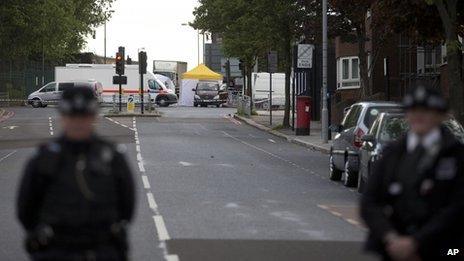Ofcom clears news coverage of Lee Rigby murder
- Published

Coverage by eight different news channels and programmes was examined by Ofcom
News coverage of the killing of Fusilier Lee Rigby in Woolwich did not breach broadcasting guidelines, says broadcasting watchdog Ofcom.
The watchdog received almost 680 complaints about the footage run by several news outlets on 22 May 2013.
Many found the images, including mobile phone footage from the scene, graphic and distressing and disrespectful to Fusilier Rigby's family.
Ofcom ruled the "detailed" coverage was "justified by the context".
However, it went on to issue new guidance, external about carrying appropriate warnings.
'Warnings given'
Last month, Michael Adebolajo, 29, and Michael Adebowale, 22, were found guilty of murdering Fusilier Rigby as he returned to his barracks in south-east London in May 2013.
The pair drove their car at the soldier before attacking him with knives and attempting to decapitate him.
At least two members of the public had filmed the violent incident on their mobile phone, which featured both the suspects, including one speaking directly to the camera with a machete and knife in his hands, covered in blood.
The footage was widely available through social media and was used by various broadcasters in their coverage.
Ofcom received numerous complaints accusing news programmes of giving one of the alleged attackers "a platform to justify and explain his actions", and expressing concern at the effect the content could have on younger viewers.
The watchdog went on to assess material from a range of broadcasts, including BBC News, Sky News, Channel 4 News, ITV News, London Tonight, Channel 5 News, World News Today on BBC Four and, on radio, the Iain Dale Show on LBC 97.3 FM.
It concluded that: "While the coverage was detailed and at times distressing, we did not consider that the images were too offensive for broadcast given they were appropriately scheduled and justified by the context."
Taking into account the "unprecedented nature of the incident", Ofcom took the view "that the vast majority of the audience watched or listened to these news programmes with the expectation of viewing or hearing an up-to-date account and analysis of what had happened in London.
"These would be appropriately illustrated with the most relevant and dramatic pictures available at time (television of course being a visual medium), or eye witness testimony."
It noted that, in the majority of cases, "various warnings were given to viewers", although radio station LBC broadcast a particularly "detailed and graphic description" of the incident without prior warning.
However, the station, which is primarily targeted at adults, "subsequently broadcast an apology to mitigate any offence that may have been caused".
Ofcom has now set out new guidance to broadcasters, highlighting the need to give viewers appropriate warnings before broadcasting material which might cause them "offence or distress".
The body made its rulings last year, but postponed publication until the conclusion of the criminal trial.
- Published20 December 2013
- Published19 December 2013
- Published19 December 2013
- Published19 December 2013
- Published17 June 2013